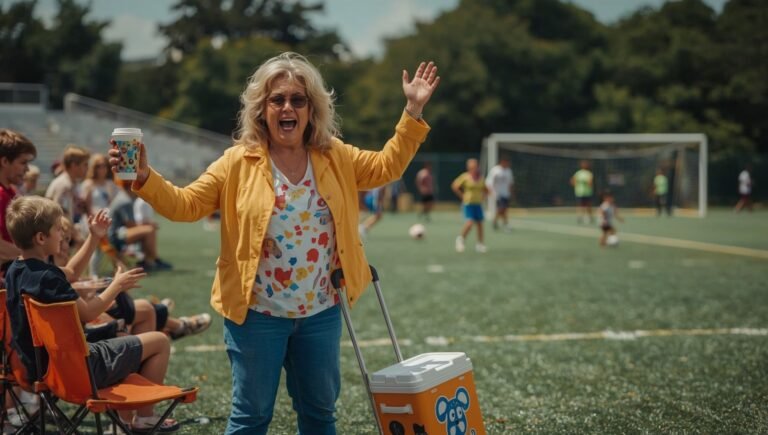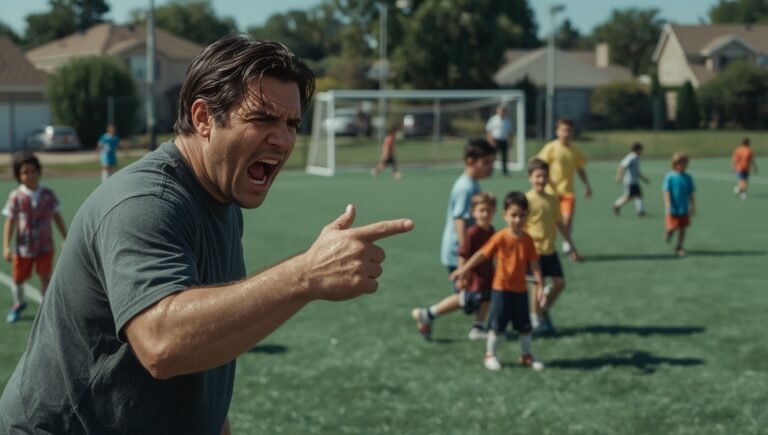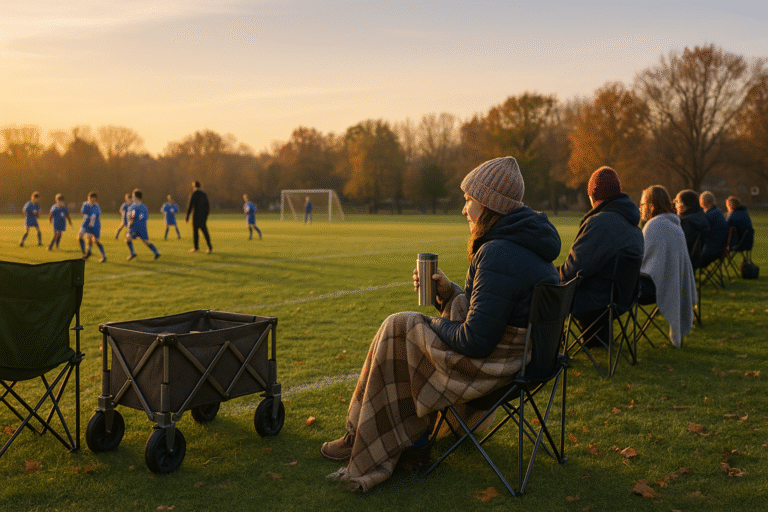Gratitude in the chaos of youth sports
Every parent who has ever survived a weekend youth sports tournament knows the rhythm by heart. The alarm that hits before sunrise. The scramble for cleats that are somehow always under the bag you already packed. The drive to a giant field complex that feels like an airport without gates, only grass and whistles. The parking lot food chain where early arrivals hunt shade like it is currency. Nine dollars for a Gatorade that tastes like warm regret. A ref who, for reasons unknown, seems to have sworn off depth perception. Your child sprints in the wrong direction, twice, then flashes you the look that says, I am trying. Somewhere between the snack bar and the moment a parent from the other team shouts coaching tips across three fields, you think, is any of this worth it?
This is where the importance of gratitude in youth sports starts to change everything. Gratitude reframes the miles and the money and the mess as a rare window into your child’s becoming. When your kid whispers thanks for the ride, when teammates thank each other for the gritty little plays nobody notices, when you thank a ref who made forty close calls in ninety minutes so your children could compete, the air around the game feels different. The scoreboard still matters, but it no longer decides whether the day was good. It becomes about pride, effort, and being here, together. If you want mechanical help from the start, bring a comfortable seat and a warm cup you love; a supportive portable sideline chair under you and a steady Stanley Quencher in your hands make it easier to stay calm long enough to notice good things.
The science behind gratitude in sports

Gratitude is not just polite manners. It is brain chemistry you can use. Researchers at UC Berkeley’s Greater Good Science Center have shown that gratitude activates the prefrontal cortex and reward pathways, releasing dopamine and serotonin, the chemicals that settle the nervous system and sharpen attention. In practice, this means a grateful athlete recovers faster from errors, sees options sooner, and stays resourceful when the heat is on. Sports psychologists add a practical layer: gratitude interrupts ruminating on mistakes and replaces it with a broader view of the game. Instead of I blew it, a grateful athlete can think I learned something, and that opens the door for the next good decision.
You can build this mindset with embarrassingly small rituals. A coach I know had his basketball team write one thing they were grateful for after every game, win or lose. By midseason the slumped shoulders and self-talk shifted. Parents noticed fewer complaints, more eye contact, and more laughter at practice. Something simple like a Five Minute Gratitude Journal tucked into a backpack turns the postgame into a reset rather than a courtroom. Gratitude does not pretend mistakes did not happen; it files them under growth so a kid can move forward.
“Gratitude is a performance enhancer disguised as a thank you.”
Sideline behavior, seen through your child’s eyes

Here is a stat that should catch every sports parent: many kids say the most stressful part of playing is not conditioning, not coaching, not even losing. It is their parents. From a child’s eye level the sideline towers over the field. Every groan feels amplified. Every face is a verdict. This is exactly where the importance of gratitude in youth sports shows up in real time. When your child sails a pass and you clap and say great hustle, they hear that effort is noticed. When a ref misses a call and you say thanks for being here, you are modeling respect under pressure, which is the entire point of this whole exercise.
The change is contagious. Teammates mimic the tone the adults set. The ref relaxes and finds a rhythm. Your kid plays freer. The entire environment shifts from surveillance to support. We went deep on this in Top 10 Sideline Meltdowns You Secretly Admired, a cautionary tour of how quickly funny becomes embarrassing when it is your voice echoing across the complex. Gratitude keeps you off that list and places you in your child’s memory as the steady voice that made the game feel safe.
“For many kids, the hardest opponent isn’t across the field. It is in the stands. Gratitude changes that.”
If your hands need a job when your mouth wants to coach, wrap them in a warm stadium blanket and clap for hustle. It is amazing how far applause travels compared to advice shouted from a folding chair.
Gratitude as a recruiting superpower

College coaches recruit skill, yes, but they sign character. Highlight reels show speed and finishing. They do not show how a kid reacts when they get subbed off or how they greet the trainer or how they talk to their parents at the fence. Coach Mike Krzyzewski once said, “Talent gets you noticed, but character keeps you there.” The importance of gratitude in youth sports is that it builds the kind of character coaches trust in locker rooms and on long road trips.
Put yourself in a recruiter’s shoes. After the fifth field of the day every midfielder starts to blur together. What cuts through is the small, memorable human moment. A lacrosse goalie says thanks for every rep and asks for one more. A striker jogs back after a miss and tells the winger nice ball. A kid holds the door for staff and says thanks for hosting. A few days later a handwritten thank you note arrives that references something specific from the camp. That note lands in the keep pile. Keep a thin stack of custom thank you cards in your bag, a pen in the glove box, and a book of stamps in the front pocket; gratitude that travels by mail still stands out in a world of mass emails.
“Stats might get you in the door. Gratitude keeps you invited back.”
Coaches quietly evaluate parents too. One NCAA assistant told me, “I know in minutes which families will exhaust us. The grateful ones make the whole program better.” Gratitude from the bleachers signals you will be a partner, not a problem.
Tournament travel, and how gratitude makes it worth it

Tournament travel is where gratitude goes to die if you do not protect it. The alarms ring before dawn. The minivan smells like damp turf, sunscreen, and French fries. The hotel lobby morphs into a middle school social experiment. By Sunday your wallet and your patience are both empty. Without a plan, the whole weekend can feel like chaos you funded.
The importance of gratitude in youth sports is that it transforms the trip into a story worth keeping. Families who build a quick gratitude round into the day, one thing after every game each person appreciate, report less stress and more laughter. A kid might say the hotel waffles. A sibling might say the pool. A parent might say watching you fight for that ground ball. Research from the University of Michigan suggests these micro-rituals strengthen family bonds during busy seasons, which explains why the drive home can feel lighter even when the record is not.
I remember a four hour drive for two thirty-minute games and a rain delay. On the way back my son said, thanks for bringing me all that way just to play twice. It did not fix the traffic, but it made every mile make sense. If you want practical help, a simple car seat organizer prevents the snack avalanche that starts most sibling feuds, and a reliable portable phone charge keeps the team app and your sanity alive at the same time.
“Gratitude is the only souvenir worth bringing home from a tournament.”
The car ride home, the most important ten minutes in sports

Ask around and you will hear the same answer. The most stressful part of the day is not the game. It is the ride home. Parents think they are offering useful feedback. Kids hear cross examination. They are still carrying the game in their chest and suddenly they are defending their choices to someone who did not feel the turf under their feet. This is where the importance of gratitude in youth sports does its quiet, essential work.
A different script makes the car feel safe. I loved watching you today. Thank you for your effort. What was your favorite moment. The conversation that follows is a relationship, not a review. One dad told me his daughter finally said, I need you to be my dad in the car, not my coach. He started with thank you for playing hard and watched her shoulders drop, then her stories come out. Gratitude does not coddle. It clears a path so coaching can happen later when a kid is ready to hear it.
“The car ride home can end a dream or protect it. Gratitude protects it.”
For a little physical cue that you are choosing calm, pop a mint before you speak. It is silly and it works. Every time you taste it you remember to breathe before you talk. Keep a small pack in the console; the cheapest tin of mints can save the most expensive season.
Team chemistry powered by gratitude

The importance of gratitude in youth sports isn’t only about individual growth, it’s about culture. Teams that notice small things and actually say thank you for them build a foundation of trust, and trust turns raw talent into timing. When a defender says, “Thanks for the cover,” or a setter tells a teammate, “Thanks for the pass,” the message becomes clear: we’re in this together. That small exchange changes everything. Suddenly the mood is lighter, huddles are louder, and players look each other in the eye with confidence instead of doubt.
I once watched a coach introduce a ritual at practice: every player had to thank a teammate for one specific thing from the previous game. At first, it was awkward. The kids shuffled their feet and mumbled. But within two weeks, they were listening closely during games just so they’d have something real to thank someone for later. By playoffs, the bench was electric in the best way. Arguments that used to bubble under the surface never took root, because gratitude had become the team’s default language.
“Gratitude does not guarantee a banner. It guarantees a culture.”
If you want to help a coach build this kind of chemistry, it doesn’t take expensive programs or leadership workshops. It can be as simple as handing players a stack of sticky notes and having them post quick thank-yous on a locker room wall after practice. That five-dollar ritual pays dividends every single game. Gratitude gives kids permission to notice effort, not just outcomes and that kind of culture outlasts wins and losses.
Beyond the game, why gratitude travels farther than trophies

Most kids will not play in college. Almost none will make a living from sport. The importance of gratitude in youth sports is that it trains habits that carry into classrooms, jobs, relationships, and communities. Research in applied sport psychology links gratitude with higher academic engagement, steadier leadership, and lower anxiety. Translate that into adult life and you get something simple and rare: a person who can hear hard things without collapsing, say thank you when they are tired, and keep showing up.
Years from now, the medals will tarnish and the jerseys will fade. Gratitude will still fit. It will be there in the email your kid writes to a teacher, the way they greet a server, the way they accept a correction at work. The daily practice of noticing good things and appreciating people becomes an identity that outlasts two halves or three periods.
“Gratitude is the trophy that never gathers dust.”
True stories, because feelings follow facts
A soccer mom who loved her daughter ferociously also loved play-by-play breakdowns. After one game the girl said, can we just drive. The mom tried an experiment. She said, thank you for playing hard. She asked, what was your favorite moment. Her daughter talked the whole way home and kept playing long after friends quit.
A hockey dad had a rep for complaining about ice time. One season he decided to send a short thank you after every tournament. Thanks for organizing the hotel block. Thanks for benching him when he loafed on the backcheck. Thanks for pushing him. Nothing else changed and everything changed. Coaches invested more because they felt supported rather than surveilled.
A middle school lacrosse goalie thanked refs as he shook hands. He did it because his coach asked him to and because he realized the grownups in stripes take a lot so kids can play. Referees noticed. Parents noticed. A local paper noticed. Gratitude shaped a season and a reputation.
Making gratitude a habit that sticks

The importance of gratitude in youth sports grows when it moves from occasional to automatic. Habits need cues. Tie yours to moments that already exist. When the cleats come off, say one thing you appreciated. When the seatbelt clicks, ask one favorite moment. When the uniform goes in the laundry, say one thanks to someone outside the family who made this week possible.
Put reminders where you live. A simple whiteboard calendar on the fridge with three boxes labeled practice, game, grateful keeps the rhythm visible. On social, try one public thank you for every score post. Thank refs. Thank the snack parent. Thank the team manager who chases paperwork so kids can just play. The feeling you create will return to your child when they need it most.
“Gratitude works like conditioning. Repetition turns it into reflex.”
The real trophy
Youth sports is a big business. Travel, gear, hotels, the whole orbit. It is easy to forget why you started. The importance of gratitude in youth sports is that it brings you back to the reason you set an alarm in the first place. Gratitude keeps kids in the game, keeps refs on the field, keeps teams together, and keeps parents human. One day the whistles will stop. The cleats will find the back of a closet. What will remain is how it felt to do this together. Your child will remember whether you said thank you.
“The scoreboard fades. Gratitude does not.”
Do gratitude journals really help athletes, or is it just busywork?
Gratitude journals actually work because they give athletes a physical way to process what went right instead of only replaying mistakes. A young soccer player who writes, “I’m thankful I made three good passes today” starts rewiring their brain to notice effort and progress. Over time, this reduces stress and builds confidence. Tools like the Five Minute Gratitude Journal are easy for kids to use after practice or games and create lasting habits that go far beyond sports.
How can parents show gratitude without sounding fake or forced?
The key is to be specific. Kids can spot fake praise a mile away. Instead of the generic “Good game,” try saying, “I loved how you kept hustling after that turnover” or “Thank you for encouraging your teammate.” Specific gratitude feels authentic and helps your child recognize the behaviors that truly matter. The importance of gratitude in youth sports is not about flattery, it’s about building meaningful connections through honest appreciation.
Does gratitude really improve athletic performance?
Yes, and science backs it up. Studies from UC Berkeley and the NCAA show that athletes who practice gratitude have lower cortisol (the stress hormone), better focus, and higher resilience under pressure. A lacrosse goalie who can reframe a missed save with gratitude is less likely to spiral, which means they’re ready for the next shot. Gratitude doesn’t guarantee a win, but it creates the mindset that allows athletes to perform at their best.
What’s the role of gratitude for referees and officials?
Referee burnout is real—seventy percent of youth sports officials quit within three years, most citing abuse from parents and coaches. A simple “thank you” after a game can make a massive difference. When players and parents show gratitude to refs, it not only improves the experience but also helps keep youth sports staffed with people willing to return. Gratitude turns refs from punching bags into partners in the game.
Can gratitude really change the “car ride home” dynamic?
Absolutely. Research from Michigan State shows the car ride home is the most stressful part of youth sports for kids. Parents often use that time to critique, but kids interpret it as pressure. Gratitude changes the entire vibe. Saying, “Thank you for playing hard today” instead of dissecting every play builds trust, keeps kids excited about their sport, and protects your relationship. It’s the simplest, most powerful change any sports parent can make.
How can gratitude prepare kids for life beyond sports?
The reality is that most kids won’t play in college, and almost none will go pro. But the lessons of gratitude will follow them long after the games end. Studies show athletes who learn gratitude are more likely to succeed academically, demonstrate stronger leadership in school and work, and handle stress better in adulthood. The importance of gratitude in youth sports is that it turns the chaos of competition into lifelong skills that matter in classrooms, careers, and relationships.








